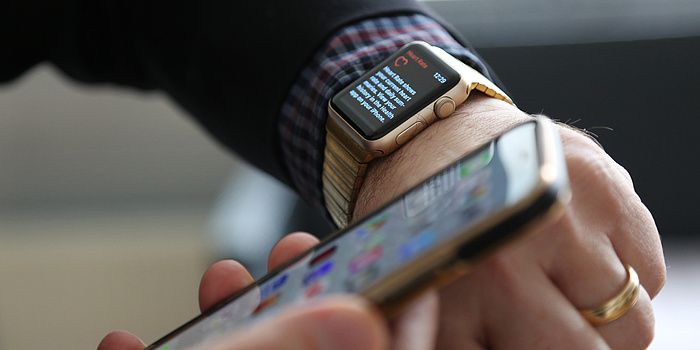How smart is our health?

Christian Poellabauer studied at TU Wien (Vienna University of Technology). For his doctorate he moved to a different continent and worked at Georgia Institute of Technology in the US state of Georgia. Today he is a professor at the University of Notre Dame du Lac – a private university in Indiana. His areas of focus are mobile computing and wireless networks, and he specialises in applications in the health sector. Poellabauer is a Fulbright Scholar at the Institute of Technical Informatics at TU Graz (Graz University of Technology)..
The “Fulbright Austria Grants for Teaching, Research, Career Development, or Institutional Collaboration” finance the exchange of academics between USA and Austria.
News+Stories: What exactly is smart health?
Christian Poellabauer: The main question in our research is: How can we use our current information and communication systems in order to improve our health system and especially healthcare? We would like to be able to make better predictions about what illnesses could occur in which persons in the future. Therapy could be individually adapted and would possibly be more effective. People should know in more detail what helps them to remain healthy and how they can adapt their behaviour. The aim of this, of course, is to improve quality of life. And of course through our research we want to improve our understanding of illnesses per se.
How do doctors react to your research?
Christian Poellabauer: They basically want more support in their work, more information. But of course they want to keep control. I see it like this: we can provide them with more information so that they can make well-founded decisions. But in the final analysis, a decision must always be taken by a person.
Where can your research be applied?
Christian Poellabauer: Let’s take an example of working on a project which deals with speech control in operating theatres. Surgical interventions often last many hours and the surgeons need information about medication which has already been administered and about the patients themselves. The operation cannot be simply interrupted in order to look at a computer. So a speech control and voice output would help very much here.
In another project, we are conducting research into digital biomarkers. These are signals which the body sends out and by which we can trace possible illnesses. Let’s take the example of brain damage: the brain controls all the functions of the body. It has now been injured or impaired through illness. This is noticed through the different processes in the body. For instance, you could develop a device which measures the reaction of the pupils to light. Or analyse how the voice changes in time. Or measure how stable someone’s mobility is. All these are examples of new digital biomarkers.

Smartphones and Smartwatches already record a lot of health data. The market is steadily growing.
What does such a device look like?
Christian Poellabauer:
Our smart phones can already do very much in this area. But of course, wearables, such as smart watches, are also a big topic. They have built-in accelerometers, pulse monitors or completely new electrocardiograms which can monitor the heart rhythm.
For instance, we work with people with brain damage who allow us to access the movement data on their smart phones. This enables us to investigate their mobility and their social life. How often do you leave the house? How many social contacts have you got? An injury can seriously impair a person’s life, and we hope to be able to help them in the future with our findings.
But we are also occupying ourselves with mobile diagnostic devices which can recognise a possible concussion faster. This is an important topic in top-class sport. Or wearables which measure blood volume, skin resistance and body temperature, thus allowing malaria to be recognised more quickly.
All our projects have one thing in common: that we combine a wide variety of signals to be able to make an earlier diagnosis possible.
All our projects have one thing in common: that we combine a wide variety of signals to be able to make an earlier diagnosis possible.
Is this data reliable?
Christian Poellabauer:
This is currently still a big problem with the devices freely available on the market, such as smartphones. Precision is at 85 to 90 per cent. Even when these results are very good, there is still room for improvement.
Two important aspects in smart health are big data and machine learning. With the help of a lot of data gathered from individual sensors, algorithms can make very good models. The more data there is, the more accurate the result.
When more data is used, data protection becomes more important. Medical data is definitely the most sensitive private data a person has. How can you guarantee security?
Christian Poellabauer: All this data has to be carefully analysed and stored. Of course, you can recognise a particular person through lots of individual pieces of data. This is especially easy when speech data is analysed. And that’s why we are working on a model at the moment where speech data is altered and anonymized but which can nevertheless be processed correctly by the algorithm. Of course, we have to think very carefully about how much automation we actually allow.
SYou’re in Graz until the end of the summer semester. Have you got plans for any projects?
Christian Poellabauer: I hope that I can do a lot of things in the field of speech analysis in particular. But I’ll also be working in the field of autonomous driving.
Kontakt
Christian POELLABAUER
Dr.
Institute of Technical Informatics
Inffeldgasse 16/I
8010 Graz
Phone: +43 316 873 6410
cpoellab@nd.edu



